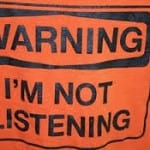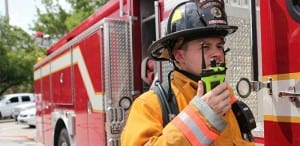 Have you ever been around someone who takes twenty minutes to tell a five-minute story? What does that do to you? I know what it does to me. It lowers my vigilance (i.e., the amount of attention I am channeling to them), it can cause me to become frustrated, bored, tune them out and find other things to give my attention to. And, it flaws my situational awareness. The same thing can happen on an emergency scene when someone is oversharing on the radio. Let’s explore this challenge.
Have you ever been around someone who takes twenty minutes to tell a five-minute story? What does that do to you? I know what it does to me. It lowers my vigilance (i.e., the amount of attention I am channeling to them), it can cause me to become frustrated, bored, tune them out and find other things to give my attention to. And, it flaws my situational awareness. The same thing can happen on an emergency scene when someone is oversharing on the radio. Let’s explore this challenge.
Information Overload
 When operating in a high stress, high consequence environment, being exposed to high volumes of information is not your friend. It is your enemy. Stress impacts the brain’s ability to analyze complex, detailed and massive amounts of data. When bombarded with information, the information processors of the brain will begin to shut down.
When operating in a high stress, high consequence environment, being exposed to high volumes of information is not your friend. It is your enemy. Stress impacts the brain’s ability to analyze complex, detailed and massive amounts of data. When bombarded with information, the information processors of the brain will begin to shut down.
If the information is auditory and your processor shuts down you may go deaf and not even realize you have. In the process of shutting down, you may experience a phenomenon where you are hearing something but cannot make out exactly what the words are. Think of the teacher on the Peanuts cartoon when she’s talking to Charlie. You hear something, but you cannot make out what she is saying.
Speed of processing
There is a limit as to how fast the brain can process auditory information and, unfortunately, a flaw in our human design is being able to talk faster than we can comprehend. This leaves us in a deficit position, trying to comprehend the meaning of a message when the words are coming at us faster than we can make sense of them.
When this happens, you may begin to cherry-pick familiar phrases or key in on words that have emotional meaning to you. But, full comprehension of the message is not likely. Unfortunately, we may “think” we are fully comprehending the message and we may find ourselves acknowledging the message as if we are fully comprehending it, only to find out later, usually after some event makes our lack of comprehension evident, that there has been a flaw in our understanding.
Radioactivity
 Have you ever known someone who was “RADIOACTIVE” meaning once they keyed up their radio they just didn’t seem to know when to shut up? We can learn to tune out people, regardless of what they are saying when they have proven they cannot control their use of the radio.
Have you ever known someone who was “RADIOACTIVE” meaning once they keyed up their radio they just didn’t seem to know when to shut up? We can learn to tune out people, regardless of what they are saying when they have proven they cannot control their use of the radio.
I once heard someone say (jokingly) that every first responder should be issued a radio (for the benefit of their safety), but not all should be issued a battery. Actually, the answer (obviously) isn’t withholding the battery. The answer is teaching responders how and when to talk on the radio and how and when to NOT talk on the radio.
Communications Training
 Very few responders (myself included) were ever taught how to talk on a radio. I don’t mean a class on how to manipulate the various features of the radio’s knobs, buttons, and switches. I mean how to talk on the radio. Some of us have been fortunate enough to have good role models who took the time to demonstrate best practices. Others, unfortunately, have not been so lucky.
Very few responders (myself included) were ever taught how to talk on a radio. I don’t mean a class on how to manipulate the various features of the radio’s knobs, buttons, and switches. I mean how to talk on the radio. Some of us have been fortunate enough to have good role models who took the time to demonstrate best practices. Others, unfortunately, have not been so lucky.
I have seen classes on the topic of radio communications springing up at various conferences I am attending and I find that encouraging because flawed communications is a significant barrier to the formation of situational awareness. Being able to convey an accurate meaning, in a few words, in a way that is commonly understood, while under stress, is an art. But it can be mastered with training and practice.
Dr. Gasaway’s Advice
 Obtain some radio recordings of stressful, complex incidents and listen to them with a critical ear. Assess the volume, speed, complexity, and detail being shared. Opportunities for improvement should jump out at you, especially if you notice there is little open airtime or if there are multiple occurrences where radio traffic is being covered up.
Obtain some radio recordings of stressful, complex incidents and listen to them with a critical ear. Assess the volume, speed, complexity, and detail being shared. Opportunities for improvement should jump out at you, especially if you notice there is little open airtime or if there are multiple occurrences where radio traffic is being covered up.
Some radio traffic is critical. Some is necessary. Some is completely unnecessary and can, with discipline, be avoided or shared face-to-face. Identify each category and ensure members know what should not be said on the radio, especially during critical times of an incident.
Radio traffic can, over time, become sloppy and inefficient. This is especially true if the sloppiness/inefficiencies have not had any consequences. For example, missed radio traffic from at-risk personnel is a near-miss. How so you may ask? Remember a near-miss is an event that, if the circumstances were just slightly different, might have a catastrophic outcome.
In some departments, it is common that radio traffic from at-risk companies must be repeated two, three or four times. It has become such a standard that no one gives it a second thought. This is especially likely to happen when there are high volumes of traffic on the radio channel. Organizations that do not see the huge potential of this problem have likely become complacent. Their guard is down because there has not been a consequence of excessive radio traffic.
Action Items
 Spend some time listening to the radio traffic of critical events on YouTube. Identify and share examples of quality radio discipline and examples of poor radio discipline.
Spend some time listening to the radio traffic of critical events on YouTube. Identify and share examples of quality radio discipline and examples of poor radio discipline.- Discuss the consequences and potential consequences of poor radio discipline that results in too much radio traffic.
- Share an example where you were impacted by a situation where someone you know was oversharing. This does not have to be an emergency scene example. Discuss the impact over-sharing had on your ability to listen and comprehend.
NOTE: For some reason… I cannot explain why… I sense action item #3 might inspire shared examples from your home life. That’s ok. Just be nice… enjoy a chuckle… but still, see the lesson in it.
_____________________________________________________

If you are interested in taking your understanding of situational awareness and high-risk decision making to a higher level, check out the Situational Awareness Matters Online Academy.
CLICK HERE for details, enrollment options and pricing.
__________________________________
Share your comments on this article in the “Leave a Reply” box below. If you want to send me incident pictures, videos or have an idea you’d like me to research and write about, contact me. I really enjoy getting feedback and supportive messages from fellow first responders. It gives me the energy to work harder for you.
Thanks,

Email: Support@RichGasaway.com
Phone: 612-548-4424
SAMatters Online Academy
Facebook Fan Page: www.facebook.com/SAMatters
Twitter: @SAMatters
LinkedIn: Rich Gasaway
Instagram: sa_matters
YouTube: SAMattersTV
iTunes: SAMatters Radio
iHeart Radio: SAMatters Radio

Good article at the right time for me, thank you Chief! My county has been struggling with a new digital radio system for a year now. We are about to reprogram all the radios with a new lay out for fire/ems. I am on the communications committee. If you could please point me in the right direction or any other articles or examples that would be helpful in making our training program better it would be so very appreciated!